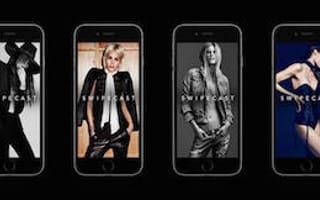As tech proliferates every aspect of our lives, it's no surprise that it's started to invade the fashion world. Online clothing retailer Gilt made an early splash in the fashion-tech space, reaching a $1 billion valuation back in 2011. Four years later, the online eyewear retailer Warby Parker, became the second fashion-tech company to join New York’s unicorn club, reaching a $1.2 billion valuation in 2015.
On the tails of New York Fashion Week, it's clear technology is continuing to pervade the fashion industry. From virtual reality shows to connected handbags, we decided to take a look at what the future of fashion-tech may hold by talking to today's industry leaders.

Mona Bijoor, CEO and Founder of Joor
 In 2010, Mona Bijoor founded Joor, an online fashion marketplace for wholesale buying. Now, the company is one of the largest B2B fashion commerce businesses. JOOR helps brands display their inventory, communicate with retailers and transact with buyers.
In 2010, Mona Bijoor founded Joor, an online fashion marketplace for wholesale buying. Now, the company is one of the largest B2B fashion commerce businesses. JOOR helps brands display their inventory, communicate with retailers and transact with buyers.
What is the biggest way the fashion industry has evolved through technology over the past decade?
The boom in e-commerce is undoubtedly the biggest evolution that has impacted the fashion industry over the past decade. Brands are embracing digital tools to both market and sell products through their websites, social platforms and mobile. As even more channels emerge, retailers are taking full advantage to reach a wider audience and engage with their customers in a true race of innovation. This instant accessibility is drastically changing the fashion industry by shaping how brands and retailers reach consumers.
From a tech standpoint, what are some of the biggest trends in the fashion industry right now?
This year, we’re seeing technology being incorporated on the runway more than ever before. We saw luxury brands such as Fendi put on an entire fashion show using drones, and we also witnessed wearables emerge not only as a tech piece, but also as a major fashion trend. Between Snapchat’s Spectacles and Hermes producing its own Apple Watch, tech has seamlessly blended with fashion, with far more to come.
How do you think tech will continue to disrupt the fashion industry over the next five years?
Looking ahead, I think we will see tech disrupting every facet of the fashion industry. Amidst new marketing channels emerging and more major brands bringing their own tech products to the consumer market, tech and fashion will continue to intersect. Having an innovative tech product will not be enough anymore; it will have to appeal to the masses and fashion is tech’s ticket to just that.
Also, the face of the storefront will get a make-over. More and more brands are switching up the in-store shopping experience by showcasing a sample or size run of items, with the option to then order on an iPad or tablet. Digitizing the shopping experience expands beyond just clothing, too. E-retail will be the primary way we get most of our daily items from paper towels to shoes.

Rachel Blumenthal, CEO and Founder of Rockets of Awesome
 Rachel Blumenthal founded Rockets of Awesome to create an online kids’ clothing retailer that takes the hassle out of shopping for children. The company uses algorithms to design and hand-pick clothes that meet kids’ individual needs and then ships the clothing to families’ homes four times a year.
Rachel Blumenthal founded Rockets of Awesome to create an online kids’ clothing retailer that takes the hassle out of shopping for children. The company uses algorithms to design and hand-pick clothes that meet kids’ individual needs and then ships the clothing to families’ homes four times a year.
What is the biggest way the fashion industry has evolved through technology over the past decade?
The fashion industry is constantly changing and evolving as new technologies develop. At Rockets of Awesome, we’re pioneering dynamic retail, which means we combine data from customers’ behavior (what they’re buying) with their kid’s preferences (based on a quick and easy style quiz), to deliver an incredibly customized experience to make parents’ lives easier. While we are a digital-first company, I believe the future of retail is meeting the customer where they want to shop and engage with your brand. Ultimately, that will require brands to be digital (with multiple touch points) and experiential.
From a tech standpoint, what are some of the biggest trends in the fashion industry right now?
Customization is a big trend in the industry right now. Brands are using data science to learn more about their customers than ever before. At Rockets of Awesome this is critical to delivering the personalized and dynamic experience.
How do you think tech will continue to disrupt the fashion industry over the next five years?
The internet fundamentally changed the customer's ability to access anything at any time. With accessibility comes the necessity for curation, storytelling and personalization. We’re going to see technology evolve to cater more directly to the needs of the specific consumer. To keep up, brands will need to keep creating really unique and personalized experiences for customers.

Peter Fitzpatrick, Founder and CEO of Swipecast
 Swipecast, a mobile marketplace for finding and booking models, was founded in 2015 by Peter Fitzpatrick. Fitzpatrick had previously founded his own modeling agency and created Swipecast upon recognizing the need to alleviate the industry’s inefficient hiring structure.
Swipecast, a mobile marketplace for finding and booking models, was founded in 2015 by Peter Fitzpatrick. Fitzpatrick had previously founded his own modeling agency and created Swipecast upon recognizing the need to alleviate the industry’s inefficient hiring structure.
What is the biggest way the fashion industry has evolved through technology over the past decade?
Overall, technology is empowering talent and creating greater transparency in the industry. There’s been a constant change and evolution in terms of the way people interact with brands and the way clients discover new talent. The rise of social media has been well documented, but the emphasis on finding influencers is growing, as is the emphasis to find ‘normal people’ as opposed to photoshopped models. At Swipecast, what we’ve done is built a platform where subjectivity is taken out of the equation and clients are able to discover people that are like this. So fashion brands like Chanel, Tommy Hilfiger and Apple are using our platform to discover people they wouldn’t ordinarily get in contact with.
From a tech standpoint, what are some of the biggest trends in the fashion industry right now?
Visuals, such as video, are powerful tools for storytelling. I think we’ll continue to see a lot more video and real-time sharing of content. This is something we continue to see across the industry, from freelancers to full-time models.
For producers within the industry, we’ve also seen the need for collaboration tools. The idea of building something like Slack for the fashion industry is a powerful one — the problem Slack solved for engineers can, and should, happen in the fashion industry.
Know of a company that deserves coverage? Let us know or tweet us @builtinnewyork.









